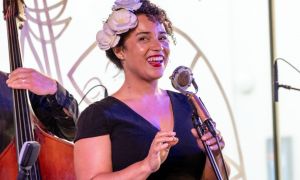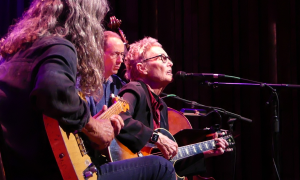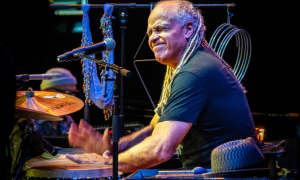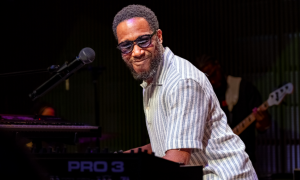Home » Jazz Articles » Live Review » TD Ottawa Jazz Festival 2017
TD Ottawa Jazz Festival 2017

Ottawa, Canada
June 23-26, 2017
Amongst the most significant challenges that face any festival is, as the gray and no-hair crowd continues to age, finding ways to cultivate and grow a younger audience. But when you're a Canadian festival, another major challenge is a simple fiscal fact: most artists—even those coming from farther afield like Europe and Asia—expect payment in American funds, and with the Canadian loonie currently resting at about 75 cents to the US dollar, it has become a serious challenge to ensure that programming continues at the same (or better) level as it was when the two currencies were closer to par.
Thankfully—and, given that the majority of its revenue comes, rather than from ticket sales, from private and public sponsors, including various arts initiatives on municipal, provincial and federal levels—the TD Ottawa Jazz Festival, now in its 37th year, continues to exist, bringing a program that not only appeals to hardcore, longstanding jazz fans, but to a younger audience as well. One of the best steps the festival took was a few years ago, when it expanded from its use of the downtown Confederation Park (abutting the beautiful Rideau Canal) to also include a second open space across the street, part of City Hall. There, the festival began a new, late night series (shows starting at 10:30PM, when many of the older crowd are heading home) called the OLG After Dark series, in a large tented structure called the Tartan Homes Stage, where acts more specifically aimed at—but by no means exclusively—the younger demographic that is so important.
Since first starting the series it has grown into one of the festival's more popular series, and with acts this year including The Lemon Bucket Orchestra,

Robert Glasper
pianob.1978
Beyond the After Dark series, the Great Canadian Jazz Series and Concerts Under the Stars—both of which take place in the larger, outdoor TekSavvy Main Stage in Confederation Park and represent a longstanding double bill that shines a spotlight on popular and up-and-coming Canadian acts as they open for the main events that takes place, for the most part, at 8:30 each evening—provide an appropriate space for big ticket items (in name, not price) like, this year: Serena Rider; Kenny Rogers; Joss Stone;

Maceo Parker
saxophone, altob.1943

Charlie Haden
bass, acoustic1937 - 2014

Carla Bley
piano1938 - 2023
Now, if the relative lack of jazz names in the Concerts Under the Stars series seems like a problem, fear not. While the festival made the necessary decision, in 2011, to open up its programming in the park, in order to bring in the large crowds that would help subsidize the vast array of jazz artists performing in other venues, it continues to easily pass the litmus test described in a 2011 All About Jazz article, When is a Jazz Festival (Not) a Jazz Festival?; simply put, those who want a "pure" jazz festival still have one, with far more jazz performances, each and every night—ranging from big names to lesser-knowns—than any jazz fan could possibly hope to see.
With the nearby, newly renovated National Arts Centre providing three venues—ranging in size from just under 200 to approximately 1,000—the TDOJF continues to maintain a top-drawer program in rooms that are, truth be told, both acoustically better and more comfortable for shows covering a broad range of names and styles. Just looking at Friday, June 23 at the NAC Theatre says it all: a de facto ECM night, with guitarist

Bill Frisell
guitar, electricb.1951

Thomas Morgan
bass, acoustic
Gary Peacock
bass, acoustic1935 - 2020

Marc Copland
pianob.1948

Joey Baron
drumsb.1955

Kenny Barron
pianob.1943

Jack DeJohnette
drumsb.1942

John Scofield
guitarb.1951

John Medeski
organ, Hammond B3b.1965

Larry Grenadier
bass, acousticb.1966

Mavis Staples
vocalsb.1939

Hiromi
pianob.1979

The Bad Plus
band / ensemble / orchestrab.2000

Donny McCaslin
saxophone, tenorb.1966

Phronesis
band / ensemble / orchestraDavid Occhipinti
guitar
Gordon Grdina
oudb.1977

Al Muirhead
trumpet
Guido Basso
trumpet1937 - 2023
The festival has also added a new venue, La Nouvelle Scene, which may be a bit of a walk away for some (roughly 15 minutes, on the outer fringe of the Byward Market), but for which the festival has introduced a free shuttle service that will bring festival-goers to/from the new Studio A hall and Confederation Park. There, more experimental acts including ex-Ottawa drummer

Nick Fraser
drumsb.1976

Tony Malaby
saxophone, tenor
Kris Davis
pianob.1980

Ab Baars
clarinetIg Henneman
saxophone
Ingrid Laubrock
saxophoneb.1970

Tom Rainey
drumsb.1957

Roddy Ellias
guitarb.1949

Adrian Vedady
bass
Shai Maestro
pianob.1987

Youn Sun Nah
vocals
Ulf Wakenius
guitarb.1958

David Mott
saxophone, baritone
William Parker
bassb.1952

Neil Cowley
pianob.1972

Ryan Keberle
tromboneb.1980

Mark Guiliana
drumsOne particularly welcome move is the relocation of the late night jam session to the Lord Elgin Hotel, across the street from Confederation Park, after a few years of various venues located farther away. For those brave enough to handle sleep deprivation by attending sessions that start at 10:30PM and can go as late as 1:30AM—and, if you're a musician, the chance to perhaps share the stage with some of the festival's bigger acts—there's the opportunity to experience true "without a net" music with unplanned collaborations, hosted by a collection of local and nearby musicians including: Roddy Ellias (with local pianist Steve Boudreau taking his place on two nights); bassist

John Geggie
bassb.1960
Alec Walkington
bass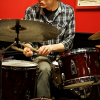
Ethan Ardelli
drums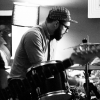
Evan Tighe
drumsThere's more. The Great Canadian Jazz Series is set to feature, amongst others: guitarist

Alex Goodman
guitarb.1987

Brandi Disterheft
bass, acoustic
Joel Miller
saxophone
Bela Fleck
banjob.1958

Jeff Coffin
saxophoneb.1965

Michael Occhipinti
guitar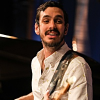
Felix Pastorius
drums
Jaco Pastorius
bass, electric1951 - 1987
And this is far from a complete list of the jazz events coming to the 37th TD Ottawa Jazz Festival. There are gigs for local acts at the Tartan Home Stage and new Confederation Park fountain at 11AM and 1PM most days and which, in addition to the Canadian Main Stage series, provides a chance for Ottawa musicians to be experienced in the context of a major festival.
And it's a festival that continues to be one of the very best values around, with its premium Gold Pass (which provides access to virtually every act in every venue across the 11 days for those over 25) costing a mere $327; and the less expensive (and slightly limited) Bronze Pass, coming in at $199. Single day, all-access passes ranging from $40 for the under-25s, to $50 for general audiences and the $70 platinum ticket, which provides for designated and guaranteed uncovered seating in the first few rows at Confederation Park; there's also the Platinum Pack, which allows fans to choose three separate Platinum tickets for a reduced price of $172. It's hard to find a better range of deals than that.
The festival has, indeed, brought an even greater focus on Canadian acts this year—a function, no doubt, of dealing with the far more expensive US Dollar; but that should not be seen as anything but a good thing: Canada has always had a vibrant jazz scene, but in recent years it seems to be positively booming, and so taking the chance on some Canadian acts that may be unknown to many will really be no risk—an opportunity to become acquainted with some of the country's top players, as well as a bevy of younger rising stars.
In other words, the 37th Annual TD Ottawa Jazz Festival continues to be one of the purest jazz festivals in the country, even with its relatively small number of non-jazz acts being brought in to help subsidize the smaller shows...but, even more, provide greater breadth and depth to a festival that may be a jazz festival, but recognizes that there are plenty of jazz fans out there whose tastes range farther afield.
Covering just a few nights this year before heading to the Festival International de Jazz de Montr©”al may be the shortest stay since first beginning to review the festival in 2004, but even those few days are filled with great music from acts known and unknown. And it's hard to beat beginning this year's festivities with the Frisell/Morgan duo, followed by Gary Peacock's trio later that same evening.
June 23: Bill Frisell/Thomas Morgan Duo
For the opening night of the festival's Jazz Warriors series, you couldn't pick a better pair of acts—both recording for Munich's lauded ECM Records and one already having released its first album in 2015 and a second due out later this summer/early fall. With Small Town representing guitarist

Bill Frisell
guitar, electricb.1951

Thomas Morgan
bass, acousticIn the many years since Frisell last recorded for ECM as a leader/co-leader, he's released a broad-scoped slew of albums for labels including Nonesuch, Tzadik, Savoy Jazz and, most recently, the Sony Okeh imprint. It was on his most recent Okeh recording, last year's When You Wish Upon a Star, that Morgan first appeared on an album by the veteran guitarist who has, over the past three decades, emerged as a cross-over guitarist who, beyond playing with a veritable who's who of jazz luminaries including

Charles Lloyd
saxophoneb.1938

Paul Motian
drums1931 - 2011

Andrew Cyrille
drumsb.1939

Stefano Bollani
pianob.1972

John Zorn
saxophone, altob.1953

Bonnie Raitt
guitar and vocalsb.1949

Allen Toussaint
piano and vocals1938 - 2015

Shawn Colvin
guitar and vocals
Paul Simon
composer / conductorb.1941

Salif Keita
vocals
Rickie Lee Jones
vocals
Elvis Costello
vocalsb.1954

Eberhard Weber
bassb.1940
Morgan's star has been on the rise since he first began popping up on the New York scene with artists including

Will Vinson
saxophone, altob.1977

David Binney
saxophone, altob.1961

John Abercrombie
guitar1944 - 2017

Masabumi Kikuchi
piano1939 - 2015

Tomasz Sta©Įko
trumpet1942 - 2018

David Virelles
pianob.1983
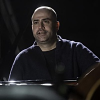
Giovanni Guidi
piano
Jakob Bro
guitarb.1978
That Morgan is as introspective as the 66 year-old Frisell was when he was the same age—still shy, but with years of touring as a leader and engaging with so many artists and fans rendering the guitarist more comfortable with his audiences—makes them the perfect pairing; and beyond that, a chemistry that clearly allows them to fluidly move through whatever music they approach with remarkable simpatico and a deep, unspoken and shared understanding.
As Frisell and Morgan entered the stage for the 7PM performance that was close to capacity at its start and completely full by its conclusion, a less shy crowd member yelled out "You're my hero, Bill!" Moments later, another called out "You're my hero too!..."and then another. Rarely speaking to his audiences beyond introducing whoever he is playing with, Frisell stepped over to the microphone and said "Thomas is my hero....and I like that other guy over there too," referring to the first shout-out. He may be soft-spoken, but this is just one more example of a guitarist whose ability to respond to his crowd with gentle wit is not unlike one aspect of his approach to playing.
And so, with nothing more to be said, the duo quietly launched into a loose look at "Monroe," from Frisell's 1999 Americana-tinged album Good Dog, Happy Man (Nonesuch). As Frisell has demonstrated in his many appearances in Ottawa and elsewhere, he possesses an uncanny ability to continue mining music that he's been playing, in some cases, for decades—bringing fresh ideas and new context to what was, at its core, a relatively simple and singable tune. The connection between Frisell and Morgan was immediately apparent, with each clearly listening intently, responding to and pushing and pulling each other while still staying close to form, albeit in a more open-ended rubato fashion. This was not a guitarist being supported by a bassist; this was two conversationalists on equal footing; and if there was a single strength (and there were many) shared between them, it was their intrinsic ability to effortlessly move from accompanist to lead voice, and to a place where no division existed and, instead, an organic range of ideas flowed from one moment to the next.
Contrapuntal foils, rhythmic anchors, and in Frisell's case chordal definer, "Monroe" slowly wound its way to its conclusion, as a brief period of complete free play ultimately resolved into the second song of the set, the title song from the 1967 James Bond film You Only Live Twice—first covered by Frisell on When You Wish Upon a Star...but there, with a larger group and sung by

Petra Haden
vocalsb.1971
Of course, Frisell also broadens any soundscape with which he's involved through judicious use of effects, ranging from looping and harmonizing to distortion, reverb, delay and more. But here, his use of the array of pedals at his feet was relatively restrained, turning to more obvious signs of effected guitar in only a couple of the pieces during an eleven-song set that included an encore of another Bond theme from 1964's Goldfinger, which seamlessly melded into a song with which Frisell has often closed his sets—and which, with the turbulence taking place in his American home, held special relevance: the Hal David/Burt Bacharach classic, "What the World Needs Now is Love."
The rest of the set was equally magical. Whether it was a quirky but still tender look at

Thelonious Monk
piano1917 - 1982

Joe Lovano
drumsb.1952

Lee Konitz
saxophone, alto1927 - 2020

Billy Strayhorn
piano1915 - 1967
And for those who have unfairly suggested that Frisell has lost his edge over the years, a ring-modulated, angular and jagged look at Motian's "Mumbo Jumbo," from the 2004 trio recording In Tokyo (JMT, 1992) laid waste to such claims, with Morgan and Frisell reiterating the sentiment later in the set, when the guitarist kicked in his overdrive pedal and the duo reached for its loudest—but still, in relative terms, comfortably quiet—moment of the performance.
Watching Morgan engage with Frisell was as compelling as experiencing the guitarist's in-the-moment responses to the bassist, who often seemed to swipe his right hand just slightly over the strings of his double bass, as he waited for just the right note for just the right moment. Frisell, whose ability to move tangentially through any structure or free passage with unerringly astute judgement, was clearly enjoying himself (as he seems always to do), often breaking into that rare, distinctive grin...long, a visual signature.
But if any single quality defined Frisell and Morgan's set it was, indeed, that relentless search for those right notes and right places. A brief solo from Morgan towards the end of the set revealed his virtuosity, just as Frisell's did the same with his remarkable ability to sustain notes while he layered line-upon-line and chord-upon-chord—here, in this vulnerable context of the duo, even more impressive as he often created cascading passages of chordal variations that could come from no-one else but Frisell.
It was improvisation at the highest level, and despite naysayers who unfairly (and mistakenly) reject his broader explorations into bluegrass, Americana folk music, blues and more as being "not jazz"—not that it matters—Frisell and Morgan can (and did) turn any song from any genre into a soothing but always unpredictable exploration that couldn't be called anything but jazz. And with this show representing the pair's first date since the week-long engagement at the Village Vanguard that resulted in the live Small Town—and another eleven dates lineup at eight festivals before concluding at the Festival International de Jazz de Montr©”al on July 2—there's no doubt that they'll continue to evolve and hone the DNA-level chemistry that Ottawa fans were the first to experience on this short but hectic tour.
June 23: Gary Peacock "Now This" Trio, with Marc Copland and Joey Baron
A short 45 minutes later, legendary bassist

Gary Peacock
bass, acoustic1935 - 2020

Marc Copland
pianob.1948

Joey Baron
drumsb.1955
Unfortunately, a technical problem with Peacock's amplifier—resulting in an annoying buzz that was finally resolved for the audience but left the double bassist struggling to hear himself as well as he should—threatened to mar the performance. But after both Peacock and NAC Theatre technicians tried but failed to resolve the problem, the bassist, instead, simply shrugged and said "let's just move on" to his bandmates. using a direct box to drive his double bass through the hall's sound system, but left unable to hear his bass as well as he should, what was most remarkable was that, according to Copland the day after the show, it turned out to be one of the best performances the trio had ever played, as Peacock played with impeccable intonation and unerring imagination.
This trio's 2015 ECM debut, Now This, is one of just a few recordings Peacock has made as a leader/co-leader, but it's always been a case of quality over quantity. More overtly free-leaning than Jarrett's trio, his trio with Copland and Baron was no less open-ended, even as it delivered a set comprised largely of jazz standards, along with one Copland composition, "Time Was"—first appearing on the pianist's outstanding 2005 solo outing for Hatology, Time Within Time, and appearing again later that same year in the context of a trio for the German Pirouet label, Some Love Songs—and a gorgeous rendition of

Joni Mitchell
vocalsb.1943
But with the ever-harmonically inventive and utterly distinctive Copland delivering his characteristically soft touch, unique use of piano pedals and an approach to volume so quiet that he now has a small amplifier situated nearby—used, when the rest of the trio begins to pick up the volume, to give him just a touch extra midrange and low-end so that he still hears his piano as he should—it didn't matter that much of the material was well-known and often covered. Yes, familiar themes emerged (though just as often from Peacock—even Baron, as the drummer demonstrated during a particularly imaginative, re-harmonized look at

Wayne Shorter
saxophone1933 - 2023
But that was, perhaps, one of the biggest joys of another set that evening where empathy was running high, and the connection between these three players nothing short of pure magic. With the age of these three musicians ranging from 61 (Baron) and 69 (Copland) to 82 (Peacock), there was the benefit of long careers and far-reaching musical experiences to bring to to this trio. Irrespective of Peacock's technical problems, from the very first note he played in his introductory solo to a gorgeous, atmospheric, at times, abstract and wonderfully rearranged look at the Italian classic "Estat©”," he was an instantly recognizable force, his lithe yet sinewy deftness suffering not one bit from advancing age.
Baron has played in contexts ranging from near-whisper to ear-shattering, and while the emphasis on this night was towards the former, that didn't stop him from laying hard into his kit at one point during his solo on "Footprints"—so much so that audience members could be heard exclaiming "whoa!," even as he turned to a softer conclusion. Capable of just about anything, in this trio Baron was as much about color as pulse; time, in fact, was often a house of cards with this trio: discernible from the collective, but something that, were one member to drop out, would fall apart instantly. That's not to suggest Baron didn't occasionally move into more overtly time-based playing, but it was more often something that could be felt rather than heard.
That said, the ever-smiling Baron—mirrored, throughout the set, by Copland and Peacock, the three in constant eye contact and with physical movements that reflected the conversational give-and-take that was fundamental to the trio's overall approach—seemed to particularly enjoy "Footprints," where Peacock reinvented its familiar 6/8 bass line into something more sophisticated, adding extra bars to the end of each round but still possessed of its irrepressible groove. It's a tune that Copland has covered more than once (including, again, on both Time Within Time and Some Love Songs), but beyond his solo reading, it's rarely been this open-ended harmonically, treated with the perfect confluence of respect for the original and the irreverence required to make it his (and the trio's) own. His touch may have been soft, but that didn't mean he couldn't—or wouldn't—lay into his piano with greater strength; it was only more dramatic when he did, however, because his attention to overall dynamics—as was true for everyone in this marvellous trio—was so profound, so erudite, so recondite.
That the trio played nothing from its first recording may mean that some of the music heard in its Ottawa performance may be on its upcoming follow-up album; on the other hand, given label head
 "
data-original-title="" title="">Manfred Eicher's general aversion to standards programming, this may be the kind of set only possible to experience in concert. At one point there was some talk, barely audible from the front row, of playing Now This' "Vignette"—a Peacock tune first introduced on his 1977 ECM recording Tales of Another (coincidentally, the first meeting of Peacock, Jarrett and drummer
"
data-original-title="" title="">Manfred Eicher's general aversion to standards programming, this may be the kind of set only possible to experience in concert. At one point there was some talk, barely audible from the front row, of playing Now This' "Vignette"—a Peacock tune first introduced on his 1977 ECM recording Tales of Another (coincidentally, the first meeting of Peacock, Jarrett and drummer 
Jack DeJohnette
drumsb.1942
But in some ways, it really mattered not what this trio played. Not unlike the Frisell/Morgan duo that came before—but in some ways, the interaction all the more remarkable for there being more players in the pool—this was a trio that turned every piece into something new and utterly personal. While Peacock and Baron are longterm members of the ECM family, it has taken far too long for Copland to finally find his way there. His approach has long suggested that the label is unequivocally the right home for him, with the pianist making his first appearance in his longstanding quartet with guitarist

John Abercrombie
guitar1944 - 2017
June 24: HUDSON
They may all be connected by living in the Hudson Valley (thus the name of this new quartet), but drummer

Jack DeJohnette
drumsb.1942

John Scofield
guitarb.1951

John Medeski
organ, Hammond B3b.1965

Larry Grenadier
bass, acousticb.1966
DeJohnette and Scofield, in particular, have shared stage and studio on more than one occasion, appearing on each others' albums as well as with many others including

Herbie Hancock
pianob.1940

Larry Goldings
organ, Hammond B3b.1968

Zbigniew Seifert
violin1946 - 1979
Scofield has also shared a now two-decade on again/off again project with Medeski's longstanding (and, for the collaborative trio, breakout) jazz jam band groundbreaker,

Medeski Martin & Wood
band / ensemble / orchestrab.1991

Brad Mehldau
pianob.1970

Pat Metheny
guitarb.1954
A description that applies, indeed, to every member of HUDSON, appearing at the TD Ottawa Jazz Festival's Jazz Warriors series relatively early on in a tour that hits jazz festivals during the summer and then reconvenes for more dates later this fall. The group's eponymous first album, released on the Mot©”ma label earlier this month, reflects the broad musical tastes of everyone involved. There are originals, ranging from the collectively composed, 10-minute opening title track—more a jam with the sketchiest of forms—and a couple of more decidedly jazz-centric originals by Scofield, including "El Swing" (first appearing on the 2011 E1 album Miles Espa?ol) and the freshly minted "Tony Then Jack," to three from DeJohnette: a reprise of the vocal tune "Dirty Ground," co-written with

Bruce Hornsby
piano and vocalsb.1954

John Surman
saxophoneb.1944
But it's HUDSON's choice of cover material that also reflects the overall vibe of the album, its broad stylistic purview...and the group's 100-minute set at the NAC Theatre:

Jimi Hendrix
guitar, electric1942 - 1970

Bob Dylan
guitar and vocalsb.1941

The Band
band / ensemble / orchestrab.1967
The beauty of HUDSON is its combination of indisputable jazz tracks blended with covers that range from relatively faithful to totally far-out and elastically stretched. Live, however, the group took the material much further than on the record; "Woodstock," for example, which was the well-deserved encore, may be relatively literal on the record, with Scofield iterating its familiar melody; but in concert, his solo went much further harmonically, as he shaped a solo built on a by-now signature ability to create marvellous tension-and-release by taking things outside, only to pull them back in at precisely the right moment. Medeski, better-known for his electric work, in particular on Hammond organ and heavily altered Fender Rhodes, stuck to acoustic piano on this balladic rendition that also added some additional chord changes at the end of each chorus, contributing a solo that made clear similar abilities in an unplugged context.
As with his past two albums, including last year's Grammy Award-wining Country for Old Men (Impulse!), Scofield eschewed the effects he's often used to augment his sound for the simplest of setups: his trusty Ibanez hollow body guitar; a good cable; and a simple Fender Deluxe amplifier. While his use of effects has increasingly grown to become one fundamental of his overall sound, like last year's memorable festival performance with Joe Lovano, the unadulterated purity of placing nothing but a cable between guitar and amp resulted in the sweet yet gritty tone that has defined his sound for the past few years...in some ways, a return to his early days and albums like Live (Enja, 1977) and Rough House (Enja, 1978).
That said, the guitarist still managed to eke a remarkable breadth of textures from this simplest of setups through his use of the controls on his guitar, alternating between pick, fingers and thumb, string scratching with pick and palm of hand and more. Sonically, in many ways, he's never sounded better, whether contributing warm-toned,

Wes Montgomery
guitar1923 - 1968
And if some of HUDSON's interpretations were somewhat (but never completely) literal, the quartet also took considerable liberties with every song, every moment. "A Hard Rain's Gonna Fall" was reinterpreted with a swinging pulse and overall approach that, once the familiar melody was out of the way, didn't just expand with the kind of expansive soloing and interpretive accompaniment that would be expected from a group of players such as these; it went into completely free territory, with Medeski—the group's sonic mad scientist—contributing ever-shifting sonics through his distinctive use of his Hammond organ's bars, as the tune gradually dissolved into no time, with the keyboardist switched to Rhodes, but taken far beyond the stratosphere with his bevy of effects, including ring modulation, as the final chorus was played, rubato, over DeJohnette's percussive maelstrom.
In a set that, compared to the previous evening, was undeniably loud (but still just barely containable by the wonderful acoustics of the Theatre), Medeski was the quartet's X-factor, proving—as he always has—to not just be a master of his instruments, but a sonic explorer who kept the rest of the quartet on its toes by adding sounds his instruments were (other than his grand piano) truly never intended to make. But amidst all the high octane music, like his playing over the two-chord vamp that drove solos from both the keyboardist and Scofield on "Wait Until Tomorrow," he also proved himself capable of great beauty...and surprising stylistic depth, as with "Up on Cripple Creek," where he opened and, even more so, closed the song with some barrelhouse piano more like The Band's dissolve at the end of the same album's "Rag Mama Rag."
Beyond a loose, ever-unpredictable approach on kit that has made him one of jazz's greatest living drummers, another surprise of the set was to hear DeJohnette sing so much: on the funky, gospel-tinged "Dirty Ground," and the final verses of "Cripple Creek," "Wait Until Tomorrow" and "Castles Made of Sand." Not that he hasn't sung before—in particular on Tin Can Alley (ECM, 1981)—but here, with his husky tone, it was something unexpected...and special. And with both Medeski and Scofield singing backup (!) to "Cripple Creek," it was a show with even more surprises than expected.
Grenadier may be known as a jazz double bassist, but his tastes clearly run much broader; beyond a couple of impressive solos, it was his accompaniment that was perhaps the most unexpected, as he combined jazz-informed freedom with locked-in grooves that made his rhythm team with DeJohnette a truly formidable one.
Tags
Live Reviews
Mavis Staples
John Kelman
Canada
Ottawa
Robert Glasper
Maceo Parker
Caravan Palace
Charlie Haden
Liberation Music Orchestra
carla bley
Bill Frisell
Thomas Morgan
Gary Peacock
Marc Copland
Joey Baron
Kenny Barron
Jack DeJohnette
John Scofield
John Medeski
Larry Grenadier
Hiromi
Edward Casta?eda
The Bad Plus
Donny McCaslin
Phronesis
David Occipinti
Erin Costello
Gordon Grdina
Al Muirhead
Guido Basso
Jean Derome
Nick Fraser
TONY MALABY
Kris Davis
Ab Baars
Ig Henneman
Ingrid Laubrock
Tom Rainey
Naked Wolf
Luc Ex
Roddy Ellias
Adrian Vedady
Shai Maestro
Youn Sun Nah
Ulf Wakenius
David Mott
William Parker
Jesse Stewart
Neil Cowley
Ryan Keberle
Mark Guiliana
Steve Boudreau
John Geggie
Alec Walkington
Ethan Ardelli
Michel Delage
Evan Tighe
Alex Goodman
Brandi Disterheft
Joel Miller
Bela Fleck
Jeff Coffin
Michael Occhipinti
Felix Pastorius
Jaco Pastorius
charles lloyd
Paul Motian
Andrew Cyrille
john zorn
Bonnie Raitt
Allen Toussaint
Shawn Colvin
Paul Simon
Salif Keita
Rickie Lee Jones
Elvis Costello
Eberhard Weber
Will Vinson
David Binney
John Abercrombie
Masabumi Kikuchi
tomasz stanko
David Virelles
Giovanni Guidi
Jakob Bro
Petra Haden
Thelonious Monk
joe lovano
Lee Konitz
Billy Strayhorn
Joni Mitchell
Wayne Shorter
Manfred Eicher
Herbie Hancock
Larry Goldings
zbigniew seifert
Medeski, Martin & Wood
brad mehldau
pat metheny
Bruce Hornsby
John Surman
Jimi Hendrix
Bob Dylan
The Band
Wes Montgomery
The Staple Singers
Stephen Stills
Robbie Robertson
Comments
PREVIOUS / NEXT
Support All About Jazz
 All About Jazz has been a pillar of jazz since 1995, championing it as an art form and, more importantly, supporting the musicians who make it. Our enduring commitment has made "AAJ" one of the most culturally important websites of its kind, read by hundreds of thousands of fans, musicians and industry figures every month.
All About Jazz has been a pillar of jazz since 1995, championing it as an art form and, more importantly, supporting the musicians who make it. Our enduring commitment has made "AAJ" one of the most culturally important websites of its kind, read by hundreds of thousands of fans, musicians and industry figures every month.
Go Ad Free!
To maintain our platform while developing new means to foster jazz discovery and connectivity, we need your help. You can become a sustaining member for as little as $20 and in return, we'll immediately hide those pesky ads plus provide access to future articles for a full year. This winning combination vastly improves your AAJ experience and allow us to vigorously build on the pioneering work we first started in 1995. So enjoy an ad-free AAJ experience and help us remain a positive beacon for jazz by making a donation today.
Ottawa
Concert Guide | Venue Guide | Local Businesses
| More...
Ottawa Concerts
Dec
23
Tue
In The Christmas Mood with The Glenn Miller Orchestra
National Arts Centre
Ottawa, Canada
Feb
6
Fri
Sinatra symphonique : Marc Hervieux
Casino Du Lac-leamy
Gatineau, Canada
Ottawa
Concert Guide | Venue Guide | Local Businesses | More...
Dec
23
Tue
In The Christmas Mood with The Glenn Miller Orchestra
National Arts CentreOttawa, Canada
Feb
6
Fri
Sinatra symphonique : Marc Hervieux
Casino Du Lac-leamyGatineau, Canada





 Buy Now
Buy Now






